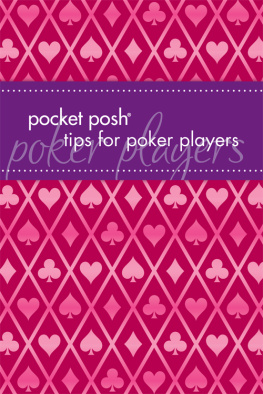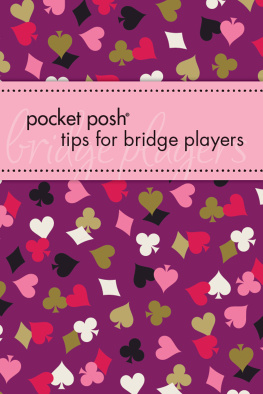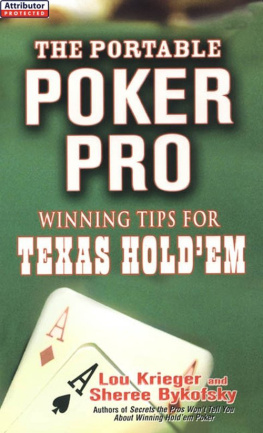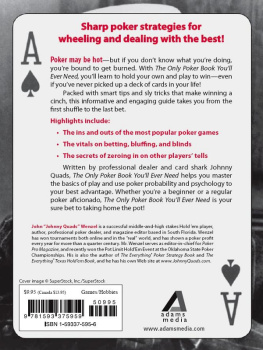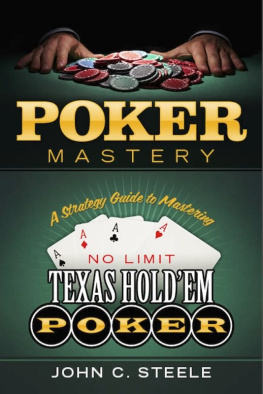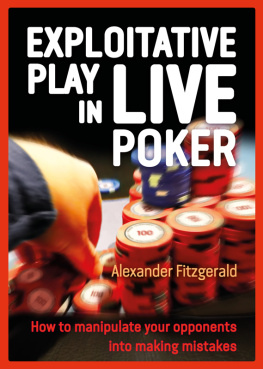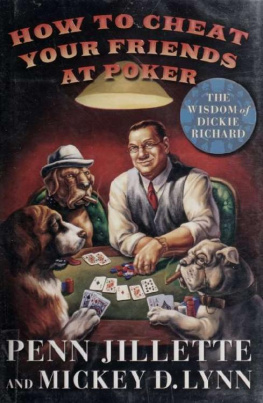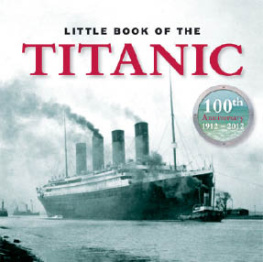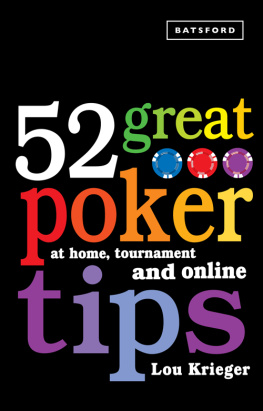Produced by
| President | Julie Merberg |
| Senior Vice President | Patty Brown |
| Layout by | Laura Smyth/Smythtype Design |
| Special Thanks | Sarah Parvis, LeeAnn Pemberton |
POCKET POSH
TIPS FOR POKER PLAYERS
copyright 2011 by Downtown Bookworks, Inc. All rights reserved. No part of this book may be used or reproduced in any manner whatsoever without written permission except in the case of reprints in the context of reviews.
Andrews McMeel Publishing, LLC
an Andrews McMeel Universal company
1130 Walnut Street, Kansas City, Missouri 64106
www.andrewsmcmeel.com
E-ISBN: 9781449407681
Library of Congress Control Number: 2011925224
ATTENTION: SCHOOLS AND BUSINESSES
Andrews McMeel books are available at quantity discounts with bulk purchase for educational, business, or sales promotional use. For information, please e-mail the Andrews McMeel Publishing Special Sales Department:
contents
how to play
HOW TO PLAY TEXAS HOLDEM
Instead of using antes, Holdem uses what are called blinds as a way to kick off the betting in each hand. Before the cards are dealt, the two players to the left of the dealer put out the blinds; the player to the dealers immediate left puts out the small blind, and the player two to the dealers left puts out the big blind (the small blind is typically half the amount of the big blind). The big blind represents the minimum bet for that hand. For example, if the big blind is 50, the player to the left of the dealer puts in 25, the player to his/her left puts in 50, and for the rest of the hand nobody can bet less than 50 at a time.
A dealer button is used to identify the player in the dealers position. Once the blinds are posted (put in the pot), each player is dealt two cards facedown starting with the small blind. These are called your hole cards or pocket cards.
Once the cards are dealt, it is then on the player to the left of the big blind to act. He or she can either fold, call the big blind (in this case 50), or raise. Play then proceeds clockwise until the betting is completed. This round of betting is referred to as pre-flop action or betting.
The dealer then discards one card facedown (the burn card) and then three faceup in the middle of the table. These three cards are called the flop and are the first of five community cards. All players still in the hand will use these in combination with their own pocket cards to make their hand. After the flop is dealt, another round of betting occurs, beginning with the player to the left of the dealer.
When that round of betting is done, the dealer places another burn card facedown and deals one card faceup next to the flop. This is known as the turn card and is the fourth community card to be shared by all players still in the hand. Another round of betting occurs.
Finally the dealer burns one more card, and deals one last card faceup, the river, next to the turn card. All players still in the hand now have seven cards (five community cards and two of their own hole cards) to make the best possible five-card hand (which can be any combination of the seven). One final round of betting occurs.
Once the final round of betting is done, there is the showdown, in which all players who havent folded their cards reveal their hands. The player with the best five-card hand (made up of any combination of his or her seven cards) is awarded the pot.
TOURNAMENTS VS. CASH GAMES
There are two formats for playing any game of poker. The first is what is called a cash game (or ring game). In a cash game, each player buys a certain amount of chips, with each chip corresponding to a specific dollar amount. Each chip is worth the actual amount of money you paid for it in real dollars. This way players are free to cash out their chips (or add more) as they please.
For example, lets say you buy in for $100. This means you get $100 worth of chips. After a few hands you find yourself down to $50. Wanting to have more chips to play with, you buy another $50 worth of chips. Your stack is now back up to $100. On the next hand you go all in and win, doubling your stack to $200. Since you have already bought $150 worth of chips, you now have a $50 profit. Since each chip corresponds to an actual amount of money, you are free to stand up from the table at any point, either keeping your profits or cutting your losses.
The other format for playing poker is a poker tournament. In a tournament, everyone starts with the same amount of chips and plays until one person has them all. There is typically a fixed entry fee to get into the tournament that everyone pays in order to get a certain amount of chips. In this way, the chips you play with in a tournament have no real-money worth in and of themselves.
For example, lets say you buy into a tournament where the entry fee is $100. While everyone pays $100 to get in, you may get 1,500 chips to play with (since everyone starts with the same amount, it doesnt matter how many chips you actually get to start). If 25 people enter the tournament, that means there will be a $2,500 prize pool to be divided among the top finishers. Like any tournament, the player who finishes first gets paid the biggest fraction of that $2,500, whoever finishes second gets the second-most, etc.
In a tournament, you are out only when you go all in and lose. You cannot leave in the middle or cash out your chips for any money since the chips have no real-money correlation. The blind levels typically start small and then escalate as time passes so that players cant simply fold all their hands waiting for other people to bust out of the tournament. Whoever finishes with all the chips is the winner.
MAKING MONEY IS THE ONLY OBJECTIVE
Poker author David Sklansky says, When we play, we must realize, before anything else, that we are out to make money. This is how success is measured in poker. When sitting down at the tables you must remember that the primary objective is to make money. It is not about winning the most pots or beating certain players who tick you off. While those goals may bring some personal satisfaction, they can only distract you from the main goal, which is to be profitable.
important concepts

